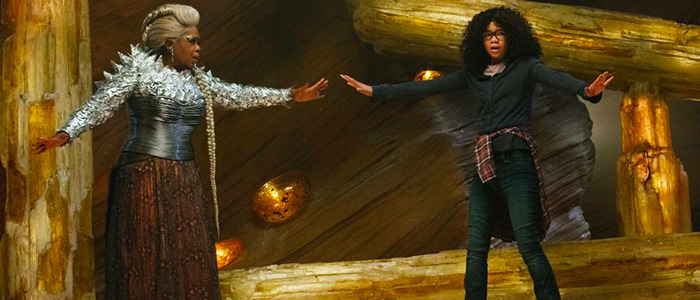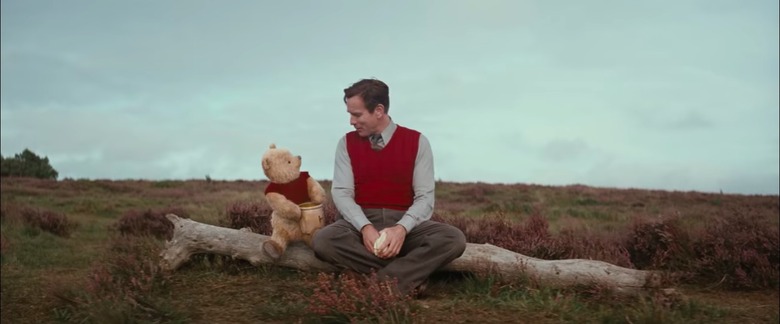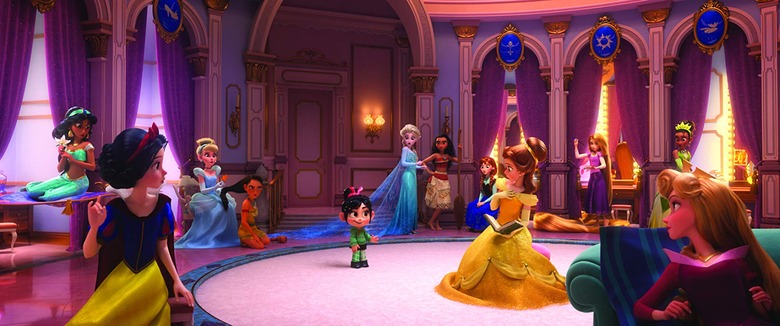Disney Is One Of The Most Successful Companies In The World – So Why Are Its Failures So Troubling?
(Welcome to The Disney Discourse, a recurring feature where Josh Spiegel discusses the latest in Disney news. He goes deep on everything from the animated classics to the theme parks to live-action franchises. In this edition: Disney may be massively successful, but its failures speak to a troubling trend.)Last month, Robert Iger, CEO of the Walt Disney Company, spoke to the financial magazine Barron's about what 2019 brings for Disney. Among the various topics, including the upcoming streaming service Disney+, the new Star Wars: Galaxy's Edge area coming to the company's continental theme parks, and more, Iger hit upon the inarguable notion that at the box office, Disney is a behemoth. He referenced the fact that Disney releases typically "between eight and ten movies a year", and that doing so will help them reach a plateau of $7 billion at the box office in 2019, a feat only accomplished by...Disney, a few years ago.But what's important to remember, and perhaps a little distressing, is that those numbers are being met thanks to the various studios Disney has acquired in its monstrous wake, as opposed to films made by the studio itself.
A Mixed Bag At the 2018 Box Office
2018 brought Disney three major box office successes: Black Panther, Avengers: Infinity War, and Incredibles 2. Whatever you think about those films qualitatively, they each grossed more than $600 million in the United States and Canada alone; even more impressive is the fact that 2018 was the first year in which Disney had three separate $600 million grossers domestically. For anyone who still loves Disney as more than just acquiring other studios, it's just a little concerning that none of the aforementioned films released by Walt Disney Studios proper (by which I mean anything not from Pixar, Marvel, or Lucasfilm) had anywhere near the same level of success. Disney is unquestionably a box-office behemoth. But it's entirely because of the studios it's acquired, which only serves to dilute its own identity now and in the future.Of the ten films Disney released in theaters in 2018, five of them were direct from their own studio, as opposed to being from a separate studio they've acquired — A Wrinkle in Time, Christopher Robin, The Nutcracker and the Four Realms, Ralph Breaks the Internet and Mary Poppins Returns. Only the latter two could be deemed moderate successes, but if you combine the domestic box-office grosses for each of these five films, it would still be less overall than the domestic gross for either Avengers: Infinity War or Black Panther. The prerogative of many, if not all, of the films from the Walt Disney Company these days is to capitalize on pre-existing intellectual property, or to make "brand deposits", as Iger has said in the past. But Disney's own brand deposits didn't pay off nearly as much as they should have this year, and portend a future when they keep missing financially if not creatively.A Wrinkle in Time was the most frustrating misstep from Disney this year; in a lot of ways, it felt like a sure thing, but wound up missing the mark. From lauded director Ava DuVernay, based on a beloved fantasy novel for children, and featuring an A-list cast, A Wrinkle in Time had its heart in the right place, and did have a few knockout sequences. But it also had misguided scenes in which the three mysterious Mrs. would either drop quotes from Hamilton, or transform into large pieces of flying lettuce. And despite the book being something of a perennial favorite in public schools, whatever amount of interest people have in the source material by Madeleine L'Engle didn't translate to the finished product, even with Disney trying to ride on the coattails of the massive multicultural success of Black Panther.
A Losing Gamble on Nostalgia
But whatever else is the case, the true concern for Disney should be in the respective box office results for the other four films they released in 2018. It can be safely argued that A Wrinkle in Time was a different kind of risk for the House of Mouse, because that was a film based on a property that wasn't a true brand deposit. Disney didn't own L'Engle's novel the way they own Winnie the Pooh, Fantasia, Mary Poppins, and Wreck-It Ralph. Those were arguably all Disney-associated properties that Disney gambled would work.The Nutcracker and the Four Realms was the biggest flop of the four, with a famously up-and-down production history that ended up with a truly unique case of one director (Joe Johnston) taking over reshoots from the original director (Lasse Hallstrom), to the point that they both ended up getting a "Directed by" credit in the final film. (When the story was first reported, the Directors Guild of America couldn't come up with a similar instance when this had ever happened before.) Depending on the source you find, Four Realms had a budget between $120 and $133 million, which doesn't account for marketing, or the very real likelihood that the Johnston-directed reshoots might have added to the film's cost. But it grossed under $175 million worldwide, thudding pretty soundly in the States with just under $55 million. The reviews were rough, and audiences simply didn't care about a movie inspired by the holiday-ballet hallmark The Nutcracker as well as Disney's 1940 classic Fantasia.While the smaller-scale Christopher Robin a) had a lower budget at a reported $75 million and b) took in nearly $200 million worldwide, it couldn't crack the $100 million threshold domestically. As I wrote late in 2018, it's easy to wonder if Christopher Robin might have wound up on the Disney+ streaming service, skipping a theatrical release, if it had been made a couple years later. Iger, in that Barron's interview, talks about how the theatrical releases Disney is handling will likely have bigger budgets, but at least two of the studio's upcoming remakes of its animated classics, The Sword in the Stone and Lady and the Tramp, are headed straight for streaming. There may be an audience for these films, but it's likely not a Beauty and the Beast-sized audience.The Marc Forster-directed Christopher Robin got a better response from critics and audiences alike. (It's technically a better film than Four Realms, but I was a fan of neither of them.) However, even a $75 million film from the biggest studio in the world has to make a boatload of cash to be profitable. Though plenty of people adore the characters from the Hundred Acre Wood, there's only so much interest in a more adult-focused story with the characters loved primarily by toddlers. Christopher Robin might have seemed like a sure bet — who doesn't like Winnie the Pooh? — but some nostalgic bets are only going to pay off a little bit.
Disney’s Two Mild Bright Spots in 2018
That leaves us with Ralph Breaks the Internet and Mary Poppins Returns, which both have made a good deal more money than the other films mentioned here, without actually being unqualified successes. To date, Ralph has grossed just over $450 million worldwide, with a domestic gross of nearly $195 million; Poppins 2.0 has made over $300 million worldwide, with more than $160 million of that coming from North America. But like Four Realms, each of these films have pretty big budgets; Ralph's reported budget is $175 million (a fairly standard number for a Disney or Pixar animated film), and Poppins 2.0 had a reported budget of $130 million. The problem isn't that these movies have flopped worldwide; it's that Disney has become so big that everything has to be a home run to be profitable. That's why Marvel's year was so good for the larger company, because they had enough smash hits. Disney had none.It's worth noting that, at least for the moment, according to Box Office Mojo, Ralph Breaks the Internet has still sold fewer tickets than Wreck-It Ralph did in 2012, and has not yet reached the worldwide box office number its predecessor did. And compared with Illumination's The Grinch, Ralph 2 didn't break out at the domestic box office. Though Ralph did get a Best Animated Feature Oscar nomination, it will also likely lose to one of the other nominees, from Incredibles 2 to Isle of Dogs to the actual best animated feature of 2018, Spider-Man: Into the Spider-Verse. Disney gambled here, as with the other films listed, that audiences would make Ralph Breaks the Internet a breakout hit, more so than its predecessor (which performed decently at the worldwide box office, but still made about $100 million less than Tangled). In effect, Disney made a brand deposit that had a smaller return than they wanted or expected.The same is so far true of Mary Poppins Returns, a film that was getting extremely high box-office predictions before its release, only to make the decent amount of money it was probably always going to make. Even if the film was wonderful (which, I say as a fan of the original Mary Poppins, it is not), there was likely a much smaller ceiling on its success with general audiences. First, musicals don't make superhero-sized money at the box office; even the Internet favorite The Greatest Showman grossed $174 million domestically, a number Poppins 2.0 hasn't met yet. And yes, people around my age (I'm 34) may have grown up with the 1964 original thanks to VHS. But the people who flocked to films like Aquaman or Spider-Man, and have made those feel more culturally relevant, are all-ages, not just older audiences.No doubt, Disney pushed hard for Mary Poppins Returns to get a few Oscar nominations, including one for Emily Blunt. But no amount of advertising was able to get Blunt a nod (and while you could criticize some studios for not marketing their films for awards, that wasn't the case with Disney and Poppins); the film received only four Oscar nods. Certainly, having any Oscar nominations might boost the film at the box office, but getting left out of major categories isn't going to help the film achieve the Greatest Showman-style legs at the box office some people hoped for. On the whole, of course, Disney's going to be just fine. This year alone, they've got Dumbo, Aladdin, The Lion King, and Frozen 2 on the way, and that's not even considering films from Pixar like Toy Story 4 and a little thing called Star Wars: Episode IX. (And yes, of course, Avengers: Endgame.) But just as 2019 is going to be the surest of sure things for Disney at the box office, the future beyond is murkier.The Lion King is almost certainly going to be the biggest-grossing film of the year, but what other sure-thing IPs does the Walt Disney Company have for 2020 and beyond? What does the future of Star Wars look like after Episode IX and the box-office disappointment of Solo? What about Marvel post-Avengers, and Pixar post-Toy Story 4? And what about Disney's own studio, where they make bets on all IP, swinging hard on every one and missing half the time? Disney can afford to swing and miss on half of their films now, only because the other half are stadium-clearing home runs. But after this year, they might find the balance tips in the wrong direction, if they keep relying on brand deposits no matter what.



